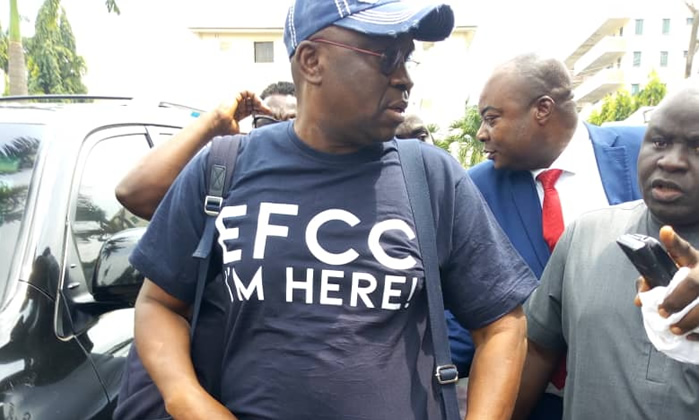Former Ekiti State Governor, Ayodele Fayose, stands accused by the Economic and Financial Crimes Commission (EFCC) of orchestrating a complex web of financial improprieties, involving a staggering sum of N6.9 billion. The charges leveled against him include stealing and money laundering, offenses he vehemently denies. The legal battle, playing out in the Federal High Court in Lagos before Justice Chukwujekwu Aneke, has taken a significant turn with Fayose’s legal team filing a no-case submission, arguing that the prosecution has failed to present sufficient evidence to warrant a defense. The court, after hearing arguments from both sides, has reserved its ruling, setting the stage for a pivotal moment in this high-profile corruption case.
Central to Fayose’s defense, presented by his counsel, former Attorney General of the Federation, Chief Kanu Agabi (SAN), is the assertion that the EFCC’s case lacks substance. Agabi contends that the core allegations, encompassing criminal breach of trust and conspiracy, are fundamentally flawed. He points to the absence of any co-conspirators charged alongside Fayose, emphasizing that conspiracy, by definition, requires the involvement of multiple actors. This omission, according to the defense, weakens the prosecution’s narrative and casts doubt on the validity of the charges. Furthermore, Agabi highlighted the absence of Abiodun Agbele, a key figure implicated in the alleged transactions, from the list of defendants, further underscoring the perceived weaknesses in the prosecution’s case.
Representing Spotless Investment Limited, the second defendant in the case, Olalekan Ojo (SAN) echoed Agabi’s arguments, adopting a similar no-case submission. Ojo focused his arguments on the credibility of a key prosecution witness, former Minister of State for Defence, Senator Musiliu Obanikoro. Ojo highlighted Obanikoro’s admission under cross-examination that there was no direct communication between Fayose and the former National Security Adviser, Col. Sambo Dasuki. This admission, according to the defense, undermines the prosecution’s claim of a direct link between Fayose and the alleged source of the funds, creating a significant gap in their chain of evidence.
Countering the defense’s claims, EFCC prosecutor, Rotimi Jacobs (SAN), urged the court to dismiss the no-case submissions. He argued that the defendants have failed to provide a satisfactory explanation for the suspicious movement of substantial funds. Jacobs questioned why Fayose chose not to utilize his personal bank accounts for these transactions if they were indeed legitimate, suggesting an attempt to conceal the origin and purpose of the monies. He further pointed to the testimonies of EFCC investigators, who detailed how Fayose allegedly used associates to purchase properties both within Nigeria and abroad. These associates, according to the prosecution, later denied ownership of these properties, despite Fayose claiming them in his statement. This discrepancy, Jacobs argues, further strengthens the suspicion of illicit activities.
The prosecution’s case rests heavily on the testimonies of witnesses and financial records, painting a picture of deliberate financial maneuvering. Jacobs highlighted Obanikoro’s testimony that Fayose personally requested the funds in cash and designated Agbele to handle the delivery. This account, according to the prosecution, places Fayose directly at the heart of the alleged transactions and demands a comprehensive rebuttal from the defense. The contrasting narratives presented by the prosecution and the defense highlight the complexities of the case, with both sides relying on witness testimonies and financial records to support their claims.
The ongoing legal battle revolves around the source and use of a substantial sum of money, with the EFCC alleging that N1.2 billion was received by Fayose to fund his 2014 election campaign, along with an additional $5 million in cash from Obanikoro, bypassing established financial institutions. Furthermore, Fayose is accused of laundering over N1.6 billion through various proxies and companies, including De Privateer Ltd and Still Earth Ltd, in violation of the Money Laundering (Prohibition) Act, 2011. These allegations paint a picture of sophisticated financial maneuvering aimed at obscuring the origin and use of substantial funds. With the court having reserved its ruling on the no-case submission, the future of this high-stakes legal battle remains uncertain. The judge’s decision will determine whether the case proceeds to the defense stage, where Fayose will have the opportunity to present his version of events, or whether the charges will be dismissed, bringing an end to the protracted legal proceedings. In the interim, Fayose has been granted permission to travel abroad for medical treatment, adding another layer of complexity to the unfolding legal drama.


